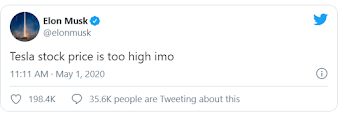For a recap of what a SPAC is and how to exploit emerging risk arbitrage opportunities in SPACs and their subsequent IPOed companies, please read the initial blog post regarding this matter which can be accessed by the following link: https://relativevalueinvesting.blogspot.com/2020/07/spacs-risk-arbitrage-with-special.html
Famed tech investor, founder and managing principal of Social Capital Chamath Palihapitya recently announced the release of three additional SPACs: IPOD, IPOE and IPOF, all intended to IPO by 2022. Each SPAC team contains one additional member from a background indicating the sector of the target company that is preferred. IPOD's extra member is Nirav Tolia, a former executive at Yahoo, Benchmark and Shopping.com, and former CEO & co-founder of Epinions and NextDoor. The presumably mid-cap consumer discretionary focused SPAC sought to raise $350 million and ultimately achieved well in excess of their goal with IPOD closing at $13.60 its first day trading representing a $400 million capitalization. IPOE's extra member is Jay Parikh, the former head of software engineering at Facebook and current board member of Atlassian corporation. This likely large-cap technology oriented SPAC planned a capital raise of $650 million which was exceeded in its debut on the NYSE by about $50 million, with shares closing at $11.62 representing an almost $700 million valuation. Finally and most impressively, IPOF's special team member is Richard Costolo, the former CEO of twitter and founder of FeedBurner which was acquired by Alphabet in 2007. The technology services aligned SPAC closed at 11.80 today with an implied market capitalization of approximately $1 Billion.
Comparable to conventional mergers and acquisitions, shareholders in the beneficiary of these deals which is likely to be the SPACs as purported by their proprietors, such as Social Capital will liquidate their position in the merged, or acquired company as was observed in the Virgin Galactic, or SPCE IPO shortly proceeding its listing on the NYSE where from October 18 to November 29, it declined by $3.13 to $7.25 per share, an approximately 30% loss. This is a common occurrence among many mergers and acquisitions according to Guy Wyser-Pratte who in his 1975 book, Risk Arbitrage suggested that many short-term shareholders in the acquired or benefiting company seeking to secure their profit, sell their shares in the new or merged company immediately upon listing or once the merger is finalized. A rally often encompasses the company benefiting from the deal preceding its closure until the benefit or consequent discount relative to the price it is presumed to be acquired for, or likely to gain is arbitraged away. Thus, one might initiate an initial long position in any of the preceding SPAC IPO of a multiple of 100 shares, or more if optimistic as to their future growth potential, write OTM covered call options, sell the options continually until the profit negates or exceeds the cost of the shares (obviously utilizing technical analysis or charting tools to ensure precise timing as rallies frequently subside within weeks or months of the listing, then cyclically recur before the merger), write ATM puts for new stock of merged company during first weeks of listing when short-term shareholders are liquidating(again utilizing technical analysis or chartings tools, etc.), and finally await the short term appreciation of the remaining stock held in the merged company, assuming Palihipitiya creates value for shareholders in these SPAC IPOs as achieved in their previous ventures, (e.g. Virgin Galactic, or SPCE which appreciated by an excess of 200% from its IPO in October to February 19).


